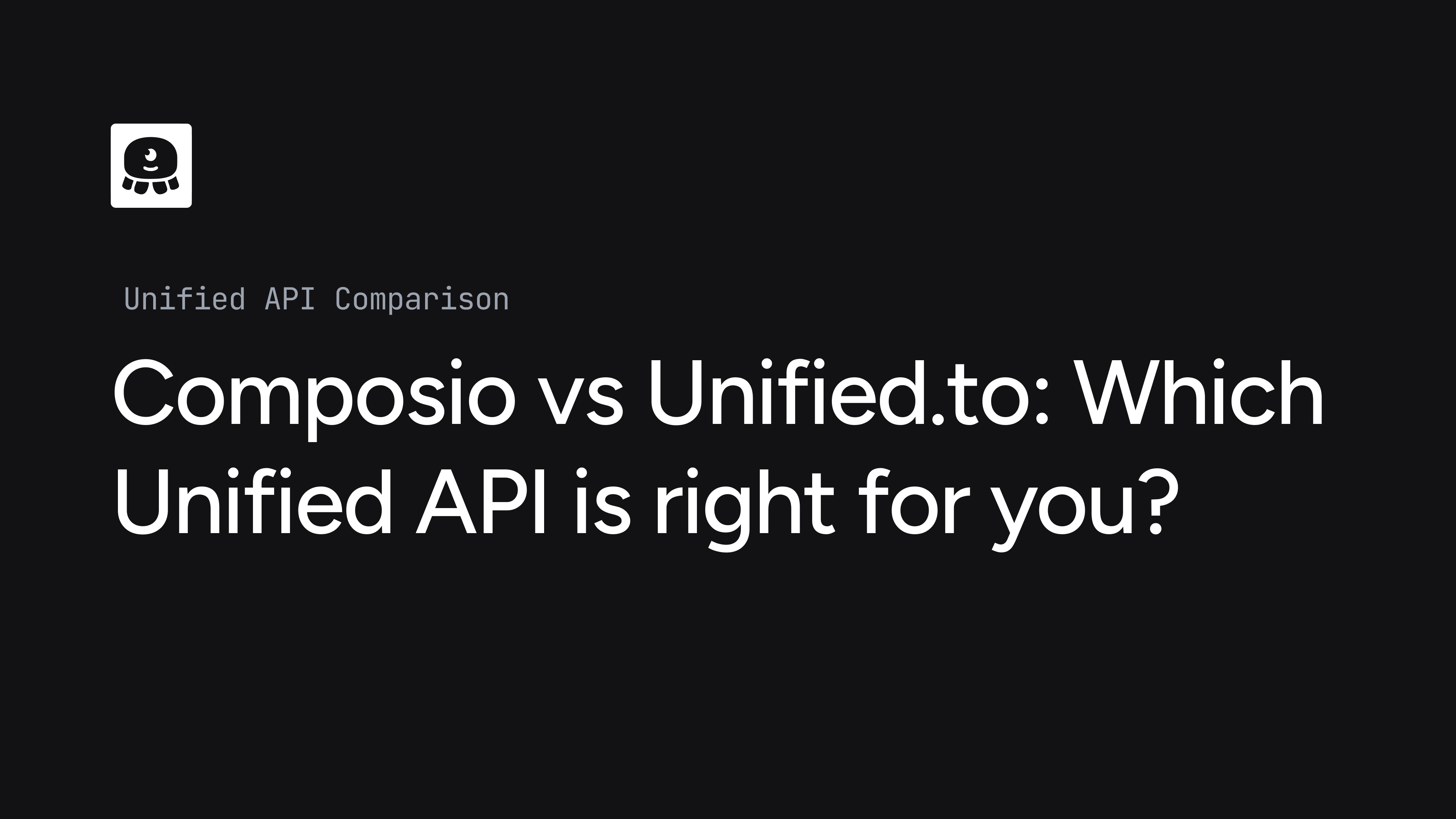Composio vs. Unified.to: which platform powers real-time SaaS integrations better?
June 15, 2025

Composio and Unified.to both aim to simplify integrations in the era of AI. But while Composio is focused on AI agents performing actions across tools, Unified.to is purpose-built for B2B SaaS teams who need real-time data pipelines, unified schemas, and zero-maintenance delivery.
If you're building a SaaS product that depends on customer data—from CRMs, HR tools, ATS platforms, calendars, or accounting systems—you'll hit limits fast with Composio's agent-first architecture.
At a glance: Unified.to vs Composio
Composio is a tool execution layer for AI agents. Unified.to is infrastructure for products that rely on real-time integrations, persistent data, and unified schemas.
Unified.to offers:
- Clean, normalized data across 300+ APIs
- Native + virtual webhooks for real-time sync
- Database streaming for RAG and AI pipelines
- Zero data stored—no compliance risk
- Secure, embeddable auth components
Here's a breakdown of how the platforms differ, especially if you're building an AI-native product or integrating across multiple categories.
Real-time sync across all APIs—without polling jobs or agent hacks
Composio lets LLMs invoke APIs and listen to some events—but it's up to you to decide when to fetch, how to sync, or whether to poll.
Unified.to eliminates that burden. It delivers structured, real-time events using native webhooks when available—or 'virtual webhooks' when not. You get event-driven sync from CRMs, HRIS, ATS, calendars, and more—without maintaining schedulers, state trackers, or polling logic.
Unified schemas—not one-off actions or tool wrappers
Composio exposes raw API actions. Each connector returns native fields. There's no normalized schema across integrations.
Unified.to provides a common schema for every category. Employee records from BambooHR and Personio follow the same model. CRM contacts look the same across Salesforce, HubSpot, and Zoho.
This means:
- No prompt tuning per provider
- Cleaner ingestion into vector DBs or analytics pipelines
- Easier testing, less connector-specific edge cases
Built for product integrations—not just AI agents
Composio was designed for AI tool use. Great for agents. But less suited for SaaS products needing long-term, embedded integrations.
Unified.to gives you persistent connections, scoped access, and structured data delivery into your app, database, or AI layer. It's built for production workloads—not prototypes.
Database-ready delivery for AI pipelines and analytics
Composio fetches data in real time, but leaves storage, sync, and transformation to you.
Unified.to streams records directly into your database—Postgres, Mongo, or S3—normalized and ready for use. Use it to fine-tune LLMs, run analytics, or power in-app copilots with fresh context.
Zero data stored—compliance by default
Composio stores tokens and logs in its cloud by default (with retention windows). Enterprise plans support self-hosting, but storage is still required.
Unified.to stores nothing. We proxy API requests in real time. You can bring your own secrets vault. No customer data is cached, stored, or logged.
This minimizes compliance risk and simplifies data governance.
Built for developers, not agent operators
Composio's CLI and SDK are optimized for tool developers and AI builders. But if you're embedding integrations into your app, you'll still need to handle:
- Authorization flows
- UX for connecting apps
- Webhook infrastructure
Unified.to gives you everything out of the box:
- Connect UI component for OAuth and API key auth
- Webhook management
- API and SDKs in 7+ languages
- Integration directory UI
You integrate once. We handle the rest.
What customers say on G2
G2 isn't a spec sheet, but it's a useful signal for onboarding experience, support, and day-to-day usability. As of January 14, 2026, Composio is rated 4.9/5 from 7 verified reviews, and Unified.to is rated 5.0/5 from 23 verified reviews.
Composio
What users like
- Easy integrations and quick setup for connecting tools.
- Time savings for building agent-style workflows.
- Responsive support called out in multiple reviews.
What users flag
- Steeper learning curve once you move beyond basics.
- Documentation can lag product changes (mentioned as a friction point).
- Missing/immature features for some advanced use cases.
How to interpret this: Composio's reviews line up with an agent skill/tooling layer where speed and convenience matter, but advanced usage can require deeper docs and ramp time. Unified's reviews line up with an integration infrastructure layer where reliability, debugging visibility, and support throughput matter when you ship to production customers.
TL;DR: Unified.to vs Composio
| Feature | Unified.to | Composio |
|---|---|---|
| Primary use case | Real-time SaaS integrations | AI agent tool-calling |
| Integration schema | Normalized schemas across 20+ app categories | Native API formats per tool |
| Real-time support | Native + virtual webhooks + DB sync | Webhooks (if available), no managed polling |
| OAuth handling | BYO credentials or BYO vault (AWS Secrets) | Managed credentials stored in Composio cloud |
| Data storage | Zero-storage architecture | Stores tokens, logs, and event data |
| AI readiness | Structured, model-ready data for RAG/ML | Native function-calling, MCP server for agents |
| Extensibility | Passthrough API + request new integrations | Add your own tools, decorate functions for LLM use |
| Pricing | Usage-based, starts at $350/month | Tiered plans starting free, usage caps per user/call |
| Ideal for | SaaS teams building integrated products | AI teams building copilots or agent workflows |
Unified.to is infrastructure for integrated SaaS products—not just tools for agents. If your product depends on fresh, structured data from customer systems, it's the better long-term bet.
Start your free 30-day trial or book a demo to see how fast you can launch real-time integrations at scale.
